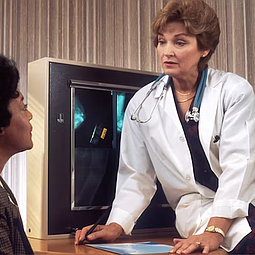Healthy Habits for your Mental Health
December 15, 2023 at 8:07 p.m.
...by Paige Bartlett, Public Information Specialist, de Tornyay Center for Healthy Aging
Throughout our lifespan, it’s likely that we or someone we love will at some point deal with mental health issues. A Harvard study found that about half of people will have a mental health disorder at some point in their life, and about 14% of older adults live with a mental illness, according to the World Health Organization. Other negative mental health experiences, like stress, are a common part of life for everyone.
UW School of Nursing Associate Professor Jean Tang is the newest member of the de Tornyay Center for Healthy Aging’s executive team and a Psychiatric and Mental Health Nurse Practitioner (PMHNP). Recently, she’s become increasingly interested in how to protect against mental illness through lifestyle, in addition to medications when needed. These pillars of maintaining good mental health include social interaction, physical movement, balanced nutrition and good sleep, says Tang.
 UW School of Nursing Associate Professor Jean Tang is the newest member of the de Tornyay Center for Healthy Aging’s executive team If you’re struggling to get good sleep, the American Academy of Sleep Medicine has a list sleep tips, also known as “sleep hygiene”. Some suggestions you might have heard before, but others might be surprising, like getting out of bed if you can’t sleep after 20 minutes.
UW School of Nursing Associate Professor Jean Tang is the newest member of the de Tornyay Center for Healthy Aging’s executive team If you’re struggling to get good sleep, the American Academy of Sleep Medicine has a list sleep tips, also known as “sleep hygiene”. Some suggestions you might have heard before, but others might be surprising, like getting out of bed if you can’t sleep after 20 minutes.
Talking to a health care provider about your health problems could be helpful too. A provider could adjust medications, treat symptoms from other conditions that might hurt sleep, adjust medications that might interfere with your sleep, or provide other sleep resources, advice, or treatments.
Making time to talk with others, and nurture our relationships with friends and family, is another powerful way to improve our mental health. It can lift our mood, improve our health, and it helps us build stronger support networks to weather difficulties times.
“We are social beings. Interacting with people helps to stimulate our brain health,” says Tang. “And it’s a protective factor to prevent Alzheimer’s or dementia.”
Getting moving can also be important for mental and physical health, and it has the added benefit of helping with sleep. Classes are a great way to pair movement and social connection. For people with physical limitations, chair yoga is becoming more popular, says Tang, and there are local dance classes for people with Parkinson’s Disease.
“There are a lot of resources for people,” says Tang. “It’s more of finding that initial motivation.”
If starting an exercise routine seems daunting, you can always start small. Even turning on your favorite music and swaying to it is a great way to get moving and release the emotions trapped in the body, says Tang.
Having good habits can help protect us against mental health problems, but it doesn’t prevent them. If you’re struggling day to day, enough that it’s really impacting your relationships or important day to day tasks, it’s a good time to talk with a health care provider.
“Be open to talk about it with the provider,” says Tang.
These topics can sometimes feel vulnerable to talk about, but mental health struggles are a common part of life, and your health care provider might be able to help.
To make the most of your appointment, Tang recommends coming in prepared. Think about when each of your symptoms started, the potential trigger, what helps them, and what makes them worse. Write it down if you think you might forget.
Mental health can sometimes go overlooked, but if we ignore it, it can have a real impact on our day to day life. Boosting our mental health through healthy habits and talking to our health care provider when it affects work and relationships, can help keep us happy and healthy.
UW School of Nursing Associate Professor Jean Tang is the newest member of the de Tornyay Center for Healthy Aging’s executive team and a Psychiatric and Mental Health Nurse Practitioner (PMHNP). Recently, she’s become increasingly interested in how to protect against mental illness through lifestyle, in addition to medications when needed. These pillars of maintaining good mental health include social interaction, physical movement, balanced nutrition and good sleep, says Tang.
 UW School of Nursing Associate Professor Jean Tang is the newest member of the de Tornyay Center for Healthy Aging’s executive team
UW School of Nursing Associate Professor Jean Tang is the newest member of the de Tornyay Center for Healthy Aging’s executive team
Talking to a health care provider about your health problems could be helpful too. A provider could adjust medications, treat symptoms from other conditions that might hurt sleep, adjust medications that might interfere with your sleep, or provide other sleep resources, advice, or treatments.
Making time to talk with others, and nurture our relationships with friends and family, is another powerful way to improve our mental health. It can lift our mood, improve our health, and it helps us build stronger support networks to weather difficulties times.
“We are social beings. Interacting with people helps to stimulate our brain health,” says Tang. “And it’s a protective factor to prevent Alzheimer’s or dementia.”
Getting moving can also be important for mental and physical health, and it has the added benefit of helping with sleep. Classes are a great way to pair movement and social connection. For people with physical limitations, chair yoga is becoming more popular, says Tang, and there are local dance classes for people with Parkinson’s Disease.
“There are a lot of resources for people,” says Tang. “It’s more of finding that initial motivation.”
If starting an exercise routine seems daunting, you can always start small. Even turning on your favorite music and swaying to it is a great way to get moving and release the emotions trapped in the body, says Tang.
Having good habits can help protect us against mental health problems, but it doesn’t prevent them. If you’re struggling day to day, enough that it’s really impacting your relationships or important day to day tasks, it’s a good time to talk with a health care provider.
“Be open to talk about it with the provider,” says Tang.
These topics can sometimes feel vulnerable to talk about, but mental health struggles are a common part of life, and your health care provider might be able to help.
To make the most of your appointment, Tang recommends coming in prepared. Think about when each of your symptoms started, the potential trigger, what helps them, and what makes them worse. Write it down if you think you might forget.
Mental health can sometimes go overlooked, but if we ignore it, it can have a real impact on our day to day life. Boosting our mental health through healthy habits and talking to our health care provider when it affects work and relationships, can help keep us happy and healthy.





